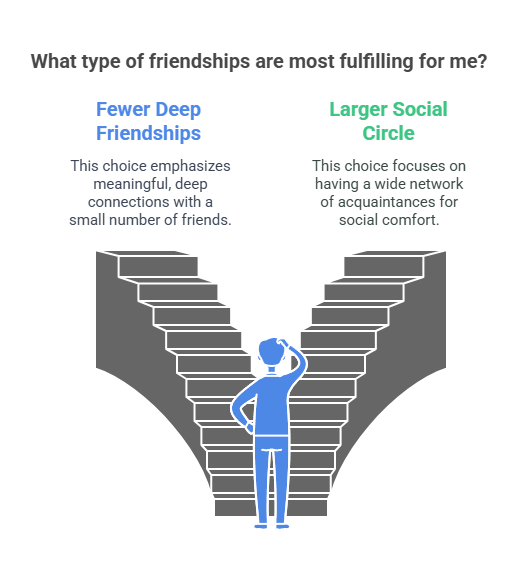Connecting with other people is one of the very basic requirements of the human race, but it can be unusually difficult in today’s fast-paced world how to make friends.
Being new to a city, looking for a larger social circle, or just wanting to make your relationships deeper is all possible with the friendship-making skill, something that can make a positive difference in your life.
This practical reference tool will guide you through the whole process, from understanding what friendship is all about to dealing with social anxiety, meeting new friends, and maintaining those relationships in the long run.
At the end of the day, you will be sure that you have in your hand a definite strategy to build solid and long-lasting relationships that enliven your life.
Understanding the Basics of Friendship
Friendship is far from being a solely social construct solution; it is rather a prime factor of our emotional and psychological welfare.
From a psychological point of view, according to Erving Goffman, friendship is a type of mutual relationship that is characterized by such qualities as trust, support, and shared experiences.
In the social context, it is perceived as the bond that gives people a sense of belonging, community, and then, sharing ideas with others.
The advantages of having a friend are so many and varied; they include everything from emotional support during the hard times to mental health benefits because of the reduced stress and increased happiness.
Friends also present some social and professional openings, which makes them an integral part of a complete, gratified life.
Identifying Your Social Needs
Before you can make new friends, it’s important to assess your current social circle and understand your social preferences.
Are you a person who prefers fewer, but deeper, friendships to a larger number of superficial acquaintances?
Or do you love to socialize and find comfort in a larger group of friends?
Do you prefer less but better friendships? If you ponder these questions, you will know what relationship type would be most fulfilling for you.
Still, understanding the latter will help you identify the types of friendships that will be most fulfilling for you.
Overcoming Social Anxiety and Shyness
Social anxiety and shyness can be significant barriers to making friends. Recognizing these feelings is the first step toward overcoming them.
Techniques like gradual exposure to social situations and cognitive behavioral strategies can help you build confidence and reduce anxiety.
Remember, it’s okay to feel nervous; the key is to take small, manageable steps toward becoming more comfortable in social settings.
Finding Potential Friends
Knowing where to meet new people is crucial. Social events, hobby groups, and online communities are great places to start.
When approaching strangers, pay attention to social cues and start with simple, open-ended questions to initiate a conversation.
Finding common ground, whether through shared interests or mutual acquaintances, can help ease the initial awkwardness and pave the way for a deeper connection.
Building Initial Connections
Small talk often gets a bad rap, but it’s an essential part of building initial connections.
The key is to move beyond superficial topics and explore shared interests.
Finding common ground can help you transition from small talk to more meaningful conversations, laying the foundation for a lasting friendship.
Deepening the Friendship
Pulling away from the stage where first acquaintance is done, taking into account the new stage may be the way out.
It can only be realized if we get to know the depth of the friendship.
For that purpose, we have to move out of the area of small talks and start sharing more of the personal stories and experiences.
Besides, you will be required to be trustworthy if you want to take good care of this budding relation;
Be the everyday you, who is ready to fulfill the promises and admit to weaknesses that can tighte.
Maintaining Friendships
To sustain friendships, hard work and communication are needed. It is crucial to stay in touch and be another’s ear which are both key to a stronger and lasting relationship.
Disagreements are bound to happen, but confronting problems right away and practicing forgiveness will enable you to cope with them and sustain a good, long-term friendship.
Expanding Your Social Circle
Introducing friends to each other and joining new groups and activities can help you expand your social circle.
Networking for professional friendships can also open up new opportunities and enrich your social life.
Special Considerations
Making friends as an adult or in a new city comes with its own set of challenges.
Understanding these unique circumstances and adapting your approach can help you build meaningful connections, whether you’re meeting people online or offline.
Quick Takeaways
- Friendship is essential for emotional and psychological well-being.
- Assess your social needs and preferences before making new friends.
- Overcome social anxiety through gradual exposure and cognitive behavioral techniques.
- Meet new people through social events, hobbies, and online communities.
- Build initial connections through small talk and shared interests.
- Deepen friendships by sharing personal stories and building trust.
- Maintain friendships through regular communication and conflict resolution.
Conclusion
Building and maintaining friendships is a lifelong journey that requires effort, understanding, and a willingness to step out of your comfort zone.
By following the steps outlined in this guide, you can create meaningful, lasting connections that enrich your life.
Remember, the key to making friends is to be genuine, patient, and open to new experiences. So take the first step today, and start building the friendships that will support and inspire you for years to come.
FAQs
- How do I make friends as an adult?
- Start by joining social groups or activities that interest you, and be open to initiating conversations with new people.
- What are the best places to meet new friends?
- Social events, hobby groups, and online communities are great places to meet potential friends.
- How can I overcome social anxiety when making friends?
- Gradual exposure to social situations and cognitive behavioral techniques can help reduce anxiety and build confidence.
- How do I deepen an existing friendship?
- Share personal stories, ask deep questions, and build trust through consistency and vulnerability.
- What should I do if I have a conflict with a friend?
- Address the issue early, communicate openly, and practice forgiveness to resolve conflicts and maintain the friendship.




